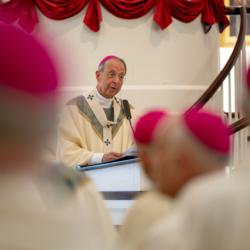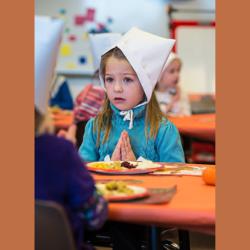Dressing up for Ordinary Time
For better or worse, my childhood days were lived before the age of the digital camera. So, I have shelves full of photo albums that tell the stories of my life. As is likely the case for many, Halloween photographs are plentiful.
While Halloween had not yet morphed into the mega-holiday it is now, I took my Halloween costumes very seriously. There were the challenges of picking a character, brainstorming the costume that would bring that character to life, and then making that costume in a way that would somehow marry an imagination that was fairly good with crafting and sewing skills that were decidedly bad. Luckily, my mom -- who was both talented and patient -- took a lead role in the costume production!
As I look at the photos in the album, I see the results of our work. Through the years, the costumes I wore included the evergreen favorites, such as cat and princess garb. But there were also years when I was decked out as the Queen of Hearts, Little Orphan Annie, Holly Hobby, and characters from favorite books, to name a few.
What is it about the excitement of dressing up that made this such a highlight of my childhood?
What is it about this fun that has catapulted Halloween into a holiday when the National Retail Federation predicts that Americans will spend more than $11.6 billion on their celebrations this year -- with $3.8 billion on costumes alone?
What is it about living -- albeit briefly -- as someone else that brings us joyous anticipation?
What is it about cloaking ourselves in the garb of someone else that makes men, women, and children scheme each year about how best to become our valiant or villainous alter egos?
I do not know.
Yet, I wonder if there is something to be said for carrying a bit of this festive sartorial spirit over to days other than Halloween.
Scripture mentions putting on the special clothing of "heartfelt compassion, kindness, humility, gentleness, and patience" and then, "over all these, put on love." (Col. 3: 12, 14). For those who live the deeply virtuous lives of those who follow Christ closely, this special clothing is no costume. It is, indeed, who they are at the core and who we celebrate on All Hallows Day.
But I wonder how life would be if we could spend time and energy to "put on" this special clothing even on those days when we are not quite ready, and even on those days when it may feel more like a costume rather than who we really are. After all, if I could wear the robes of the Queen of Hearts while merely a third grader in Queens, what would happen if I -- if we -- wore the robes of compassion, kindness, humility, gentleness, patience and love when I -- and we -- may feel as though we are merely works in progress.
Would we wear these robes for only a day and then return to being our everyday selves? Or is it possible that putting on robes such as these could really change us?
If we challenged ourselves to pick the virtues, we most wanted to display, brainstormed how we might best do so, and wore the robes of these best traits, could we change? Could we become, in words, in deeds, and in fact, a bit more like the person we dressed up to be?
I think we can!
When Halloween ends and we put aside our $3.8 billion worth of costumes, we are left as our old selves, with no trace of what we once were. (The exception that proves this rule is any costume involving glitter hair spray. Personal experience taught me that traces of glitter will remain with you until Advent dawns.)
But the cloak of a good life is different.
The cloak woven together by compassionate deeds, kind words, humble service, gentle care, patient forbearance, and loving generosity just might fit. With prayer, patience, good example, and encouragement, maybe this cloak can begin to feel like our everyday clothing and not a mere costume. Maybe it can be the way we dress up for ordinary time.
- Lucia A. Silecchia is Professor of Law and Associate Dean for Faculty Research at the Catholic University of America's Columbus School of Law.



















